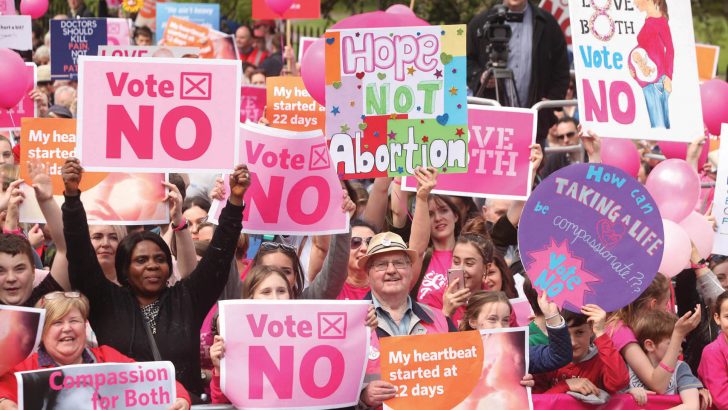The View
Next week, a compelling new documentary Ireland’s Fall: The Abortion Deception will tell the inside story behind the repeal of the Eighth Amendment. That account will differ, of course, from the narrative that has been so widely spun by abortion campaigners and their media allies who would have you believe that Ireland’s abortion law was overturned because of the plucky efforts of women striving against the might of the patriarchy.
Nothing could be further from the truth. The forces behind repeal had enjoyed the unwavering support of the establishment in Ireland for more than a decade before the vote in 2018. Using the playbook which had worked so well in other countries, they engaged in a long march through the institutions, including academia and RTÉ, to push for changes in the culture.
Yet, as Tim Jackson’s new film shows, even the backing of the media, the politically powerful, US billionaires, global NGOs, and more might not have led to abortion on demand. What was crucial to voter persuasion was the creation of false narratives, the role of media as campaigners, and interference of outside agencies – including the same tech giants who are, even now, still operating as the arbitrators of free speech.
The enormous funding to push for abortion which poured into Ireland from billionaires like Chuck Feeney and George Soros, and from US foundations, was also key to energising and sustaining abortion campaigns. A country which had amended its constitution to ensure preborn children were protected had become the focus of global forces.
Question
The documentary opens with a question: “what influences a million people to pass sentence on the innocent?”. It also finishes with a question: “who shall inherit the land, is it those who welcome each child as a gift, or those who reject new life”. Between those two queries, Tim Jackson searches for answers, and takes an unflinching look at the factors which led to the constitutional right to life of the unborn being repealed.
Interview
Amongst the journalists, campaigners, commentators and observers interviewed (I am one of that number), he interviews Prof. Robert Epstein, who has become an authority on how powerful platforms like Google and Facebook can manipulate election results. What he shares with Mr Jackson regarding Facebook’s ‘vote reminders’ should lead to hard questions and some disquieting conclusions regarding the democratic process and electoral interference in Ireland. In the aftermath of Donald Trump and Brexit, was Ireland a testing ground for powerful forces who wanted to ensure that social media could not be used by ordinary people to circumvent the establishment again?
There are insights too, into how the tragic death of Savita Halappanavar was manipulated, and how pro-life doctors and nurses were silenced by the same media who were insisting that the expert opinion of medical professionals must be heard.
Last month, RTÉ aired a very different documentary, named The 8th, which celebrated the legalisation of abortion. It cost the Irish taxpayer – through Screen Ireland – at least €150,000, though RTE won’t say what additional fees from taxpayer funds they spent on getting the right to broadcast the propaganda piece. But it did reveal the dishonesty of abortion campaigners who were told to focus only on the ‘hard cases’ in the campaign, using issues like pregnancy after rape to sell a repeal message they knew would bring about abortion on demand.
The media, as the documentary notes, were the real campaigners for abortion. They framed the debate to focus the voter’s emotions on personal stories and excluded the real issue at hand: whether it can ever be right to kill a child simply because they are voiceless, helpless and defenceless. In one contribution, barrister Maria Steen correctly observes that: “As RTÉ well knew, dead babies tell no tales.”
In Mr Jackson’s gripping film, the triumphant gloating and cheering of abortion advocates at Dublin Castle is in stark contrast to the families and stalwart grassroots campaigners who fought to protect mothers and babies, and who saved hundreds of thousands of lives from being destroyed by abortion. For more than thirty years, the right to life was protected.
Near the documentary’s conclusion, historian Seosamh O’Ceallaigh reminds us of TS Eliot’s Little Gidding: “the end of all our exploring, will be to arrive where we started, and know the place for the first time”. Mr Jackson wonders whether we can regain that compassion and sense of justice that once protected the most vulnerable. Only time will tell, but this important documentary lifts the lid on what really happened when Ireland fell.
Ireland’s Fall: The Abortion Deception will be launched online on Tuesday September 21, see TheLifeInstitute.net for further details.


 A new documentary aims to bring fresh light to the story of the 2018 abortion referendum. Photo: John McElroy.
A new documentary aims to bring fresh light to the story of the 2018 abortion referendum. Photo: John McElroy. 